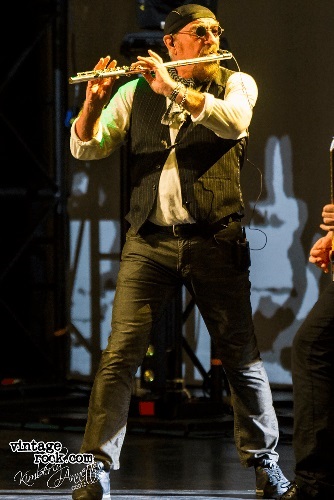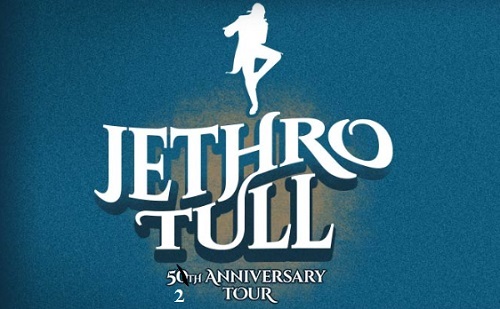Story by Shawn Perry
Though they celebrated their 50th anniversary in 2018, Jethro Tull, who formed in 1967, have carried the milestone into 2019, as Ian Anderson and company have ’50th Anniversary’ shows booked in the U.S. and Europe until the end of the year. Plus there’s the The Ballad of Jethro Tull book, which tells the band’s story in their own words, along with the highly anticipated 40th anniversary Stormwatch box set, the group’s last release of the 1970s. So it’s safe to say that Jethro Tull is operating on all fronts 52 years after they first got together.
When Anderson and the present incarnation of Jethro Tull — Florian Opahle (guitar), Scott Hammond (drums), John O’Hara (keyboards), David Goodier (bass) — rolled through California for the final stretch of the first leg of their North American tour (they’ll be back in September), those in attendance were surprised with deep Tull cuts like “For A Thousand Mothers” from 1969’s Stand Up album and “Warm Sporran” from Stormwatch. Even better was the fact that Ian Anderson was in spectacular voice and playing the flute like the wild-man he was in the 60s and 70s. And on it goes.
To celebrate 52 years of Jethro Tull, we’d like to share a few words from Ian Anderson, whose gift for intelligent, stimulating conversation has been fully intercepted and documented over the course of 17 years on VintageRock.com. Here’s a greatest hits, if you like, of his keen observations, recollections, and viewpoints on a variety of random topics.

2002 – The reunion with the original Jethro Tull lineup:
“The original band members of Jethro Tull circa March 1968 — that’s when I think we began as Jethro Tull. We’ve met each other over the years a few times, but never played together as a band. I have played with two of the guys — Mick (Abrahams) and Clive (Bunker) — but never with Glenn (Cornick) since those early years. It seemed like a nice thing to have, sort of a musical interlude going back to the original guys, and doing a couple of the songs that we had played in our early years at the Marquee Club — more like our early weeks — when we first started the band. They agreed to do it, so we got together at the end of January of this year. We got together in a little blues club in the midlands of England and did some things for the cameras. And we recorded it. It was pretty painless without much rehearsal — just a good bit of fun.”
2006 – Progressive rock in the 21st century:
“I guess I have a preference for those that aren’t trying to clone early Genesis, let alone King Crimson, Emerson, Lake and Palmer or Yes. And I guess you really have the big four there that I just mentioned. The archetypal, prog-rock band that preceded all of them was, of course, Pink Floyd who, back in 1967, performed songs from The Pipers At The Gates Of Dawn. That was progressive rock music by any definition. Jethro Tull may have, at some point in time, been associated with that genre — but only if you apply that term ‘progressive rock’ in a loose and general sense, in which case you then have to embrace the likes of Radiohead as a more contemporary act, or perhaps some of the Seattle bands of the late 80s and early 90s would qualify in that way.”
2006 – The Rock and Roll Hall of Fame:
“The Rock And Roll Hall of Fame is an American institution that’s set up to primarily celebrate American music and the derivative spin-offs of American music. In that regard, while I can see there’s a place in the Rock and Roll Hall of Fame for a lot of British acts that are truly kind of rock and roll in the sense that their music is deriving very strongly from the tradition of blues and rock music. I think Jethro Tull…we’re seen as being a little too peculiarly European or British.”
2011- The impact of Aqualung:
“It wasn’t an instant, out-of-the-box big seller. It sold steadily over the first few years of its life to establish Jethro Tull internationally. I guess it’s the album, perhaps along with Thick As A Brick a couple of years later, which defined the band being established in most of the major record markets. Today, it supplies very much the benchmark repertoire of the band. Even at my other concerts with string quartets, acoustic shows and so forth, we have two or three songs from the Aqualung album — long-established must-have songs.”
2012 -: The possibility of writing a memoir:
“I’ve thought about it a few times. There’s one fundamental flaw — it’s that I don’t feel comfortable writing about all those people that I worked with, that I counted as my companions through life, my musical friends. I really feel uncomfortable writing about those people. I enjoyed, in a scurrilous, naughty kind of way, reading Keith Richards’ book, and I loved the way he wrote fairly scathingly about a lot of people, especially Mick Jagger. As a reader, sure, I can see why that has such commercial appeal — someone’s digging the dirt here and you can participate (laughs). It’s all kind of tabloid newspaper stuff. It’s glorious if you’re not the subject of that unveiling of intimacies and trust. I couldn’t do that to people.”
2012 – Songwriting:
“I’m not a guy who writes about me, me, me, me. I’m not an Alanis-Morissette-heart-on-sleeve kind of songwriter. I’m an observational songwriter. I’m someone who writes about people in an environment. I imbue those characters with something of myself very often to give it authority. I also give them perhaps the elements of other people I know, other experiences, other examples. I tend to make composite characters based on things I know about. It’s either a little bit of me or a little bit of somebody I do know about. I’m really very, very careful not to cross…it’s a line not just written in the sand — it’s scored in concrete and you don’t cross that line and actually betray the intimacies of a relationship, I just would never do that. Do I have any stories I could tell you? Over a beer, I possibly would.”
2014 – Spoken word poetry:
“I do use spoken word in a radio broadcast or in voice-overs for documentaries. I mean, I’ve been asked to do that a few times. It’s not something I make a living out of; I just do it for fun once in a while. But the spoken word is the language of conveyance that I’m using right now. It’s the way that I put across ideas and thoughts and notions, which can either be improvised or they can be scripted. Right now, as we do this interview, you can tell probably from the sound of my voice and the articulation of my speech that everything is very, very carefully scripted indeed. And you just happen to be asking the right questions.”
2014 – Jethro Tull’s fluctuating lineup:
“To me, Jethro Tull is, historically speaking, a band of many, many different people, all of whom I think have played a very important part in the band. But in a way, what it means to me most is repertoire. Jethro Tull is the repertoire that I have written, arranged, recorded, produced, mixed, engineered in many cases, as well as having some played the flute and the guitar and the all rest of it. So to me, it’s repertoire, most of which I’m very proud. And that is where I think I see the Jethro Tull identity out there in the world.
2015 – Politics:
“I’m an arch-capitalist who thinks of only myself and my own interest. I would describe myself as either a pragmatic socialist — which, of course, is almost like being a commie if you’re an American, because socialism is something that scares the shit out of you — but I’d call myself a pragmatic socialist. I’d also call myself a benevolent capitalist, because I do believe in sharing the wealth and being responsible and ethical with your wealth-gathering aspirations as an individual. I have a pretty clear idea of who I am and what I do and what I think I admire in other people. I’m the first to say that people should be paid for what they do well. They should be encouraged, they should be nurtured. We need those kind of people. We need the Bill Gates and the Steve Jobs. But what we also need is for them to take responsible views about their own views and be prepared — as indeed the case of Bill Gates — to be something of a humanitarian, who wants to use that position to share with other people less fortunate. I think that’s an important thing we should all be prepared to do if we’re successful at that level.”
2015 – Steven Wilson and the remastering of the Jethro Tull catalog:
“Steven has said he’ll do all the stuff from the 70s and he’s working his way through that with a few more to go. I think beyond that, Steven will have inevitably — I mean, it’s an enormous amount of work. I’m surprised he’s still willing to undertake yet another Jethro Tull album in terms of the huge chore that it is. But he has a genuine fondness and, I suppose, from that music, a little bit of inspiration in his own music, as a performer and songwriter that he derives from working with heritage artists and their classic material. I’m sure a little bit of it must rub off on him. So it’s a very comfortable relationship.”
2017 – On rearranging “We Used To Know” for the String Quartets album:
“In the case of ‘We Used To Know,’ it was done in a different time signature, which actually borrowed from the reference to “Hotel California,” which employs the same chord sequence, albeit a different melody. Since many people have pointed out over the years the similarities of the Eagles’ ‘Hotel California’ and the song ‘We Used To Know,’ harmonically anyway. I thought that it would be rather fun to do a little tease. So we used the Bach feel of the ‘Prelude C Major’ as a form for ‘We Used To Know,’ which, of course, I put into a common time signature…which made it a little less like ‘We Used To Know’ and a little more like ‘Hotel California’ in places (laughs). That’s just me having a bit of fun and maybe a little playful moment.”
2018 – Tony Iommi’s brief time with Jethro Tull:
“Tony was one of the guitar players who we’d seen and knew a little about in the latter part of 1968 when Mick (Abrahams) left the band. Amongst a few others, I spoke to Tony and he came down and did a few days of fooling around with us in rehearsal. Just to see if it clicked between us. Tony was a lovely guy, but I think musically speaking he had a very defined style, somewhat as a result of the industrial accident that resulted in the loss of part of two fingers, which meant that he couldn’t really play conventional chords very easily because of the prosthetic ends to his fingers. So his musical style, which of course defined Black Sabbath, was dependent on a physical restriction. Perhaps the same way, Django Reinhardt was able to do what he did with two fingers because that’s all he had. So, he had to develop a quirky way of playing jazz guitar and he did exactly that. That was Tony’s position too. So we tried a few things together, but it didn’t work out.”
2018 – Winning a Grammy in 1989:
“The devil in me wishes I had been there, if only to walk out on the stage and confront all the people booing and hissing and generally being deeply unpleasant about it, rather than putting poor Alice Cooper through the ordeal of having to accept the award on our behalf. That’s the devil in me. But in reality, I think it would have been unfitting, or in any way to gloat or visibly be “Wow we won a Grammy,” because it was such an absurd category to be winning a Grammy in. Jethro Tull can’t be classified as a heavy metal band. Some of the music, for sure, you would call some of it hard rock, but it’s hard rock interspersed with a lot of acoustic elements and things that are far more eclectic and fall outside of that potentially simplistic category of “hard rock” oblique stroke “metal,” which was the way it was described. So, of course, it was an unlikely thing and it was the first year that they had introduced this new category and for some weird reason, we were nominated, I suppose by the record company. And that was picked up by the voting members of the National Academy of Recording Arts and Sciences. Bless them in their infinite wisdom. A suitable majority I guess of the 5,000 members decided that Jethro Tull should be the recipient of that Grammy in this new category.
“Frankly, I suppose it’s something you can’t sneer at because it would be a bit churlish to receive some peer group award. The voting members are, after all, producers and musicians — creative people in the American recording industry. So, to somehow refuse it or reject it or make light of it wouldn’t be very civilized, not very gentlemanly. You have to take the view — “Thank you very much. That’s very nice of you to do that. Very much appreciated that you thought of us.” It’s just a little bit unfortunate that it worked out in an embarrassing way for the Grammy organizers, and for Alice Cooper, and, of course, for Metallica who didn’t win the Grammy that they thought was well within their clutches. But as I said at the time: “Don’t worry Metallica, you’ll win it next year.” And I believe they did. When they did win that Grammy, they thanked, amongst their producer, their record company, their wives, their girlfriends — they thanked Jethro Tull for not putting out a new album that year. It just goes to show there’s a little bit humor, even in the darkest of metal musicians.”
2018 – When he started out, could he have ever imagined he’d still be playing the music of Jethro Tull 50 years later?
“At the point of starting of Jethro Tull, probably not. My target then, when I began, was trying to be a musician, not necessarily a successful lifetime performing musician. I thought maybe if I was lucky, I’d have a year or two, maybe even make a record. So that was the immediate goal in February of 1968. After a couple of years, I think I perhaps did feel that maybe this could go on.”





















